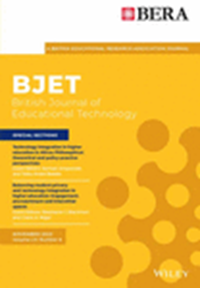Addressing the role of technology in internationalization at a distance: Voices of students' in international distance learning from Ghana—sub-Saharan Africa
Abstract
The past two decades have witnessed a surge of distance learning in higher education across the world. Scholars have argued that this is due to the increasing use and recognition of technologies to act as a means, channel and source for internationalization of knowledge. Further, internationalization at a distance (IaD) has seen a rapid increase in universities in Ghana, sub-Saharan Africa, due to increased use of digital technologies and high demand for foreign education. Yet, there remains limited research about the role of technologies in facilitating and mediating IaD in countries in sub-Saharan Africa. Moreover, few studies have explored students' experiences in IaD regarding prospects and challenges in Ghana, sub-Saharan Africa. Therefore, the purpose of this research is to explore students' experiences and voices regarding the role of technologies in facilitating and mediating distance learning including students' critical reflections on the technological shift of IaD in higher education (including the COVID-19 pandemic period) in Ghana. Data were collected following a qualitative research design via an in-depth semistructured interview of 28 students (16 females and 12 males) enrolled in IaD learning program in three foreign universities (two in the United Kingdom and one in the United States). Data analyses were done via a constant comparative approach. Findings showed that students experienced enhanced quality of learning through the varied use of technologies such as Zoom, Team and Google Hangouts. However, students faced challenges such as unequal access to technologies, intermittent Internet connections/outages, high cost of tuition and lack of social and teaching engagement. These findings in many ways contribute to a new understanding and knowledge building of students' experiences and challenges of IaD in sub-Saharan Africa.
Practitioner notes
What is already known about this topic?
- The number of students in internationalization at a distance (IaD) education programs is increasing alongside the development of digital technologies and the expansion of digital infrastructure.
- Increasing demands for higher education in sub-Saharan Africa have led to an increase in the number of students from Ghana in IaD.
What this paper adds?
- Ghanaian students in IaD benefited from the use of various digital technologies, improving their engagement and facilitating the acquisition of digital skills.
- They faced barriers in accessing digital technologies and Internet connectivity.
Implications for practice and/or policy
- Pretraining programs and workshops to enhance students' digital skills before starting distance education could be beneficial for Global South students in IaD.
- Education provider should support the access to digital technologies and Internet connectivity of Global South students in IaD.




 求助内容:
求助内容: 应助结果提醒方式:
应助结果提醒方式:


